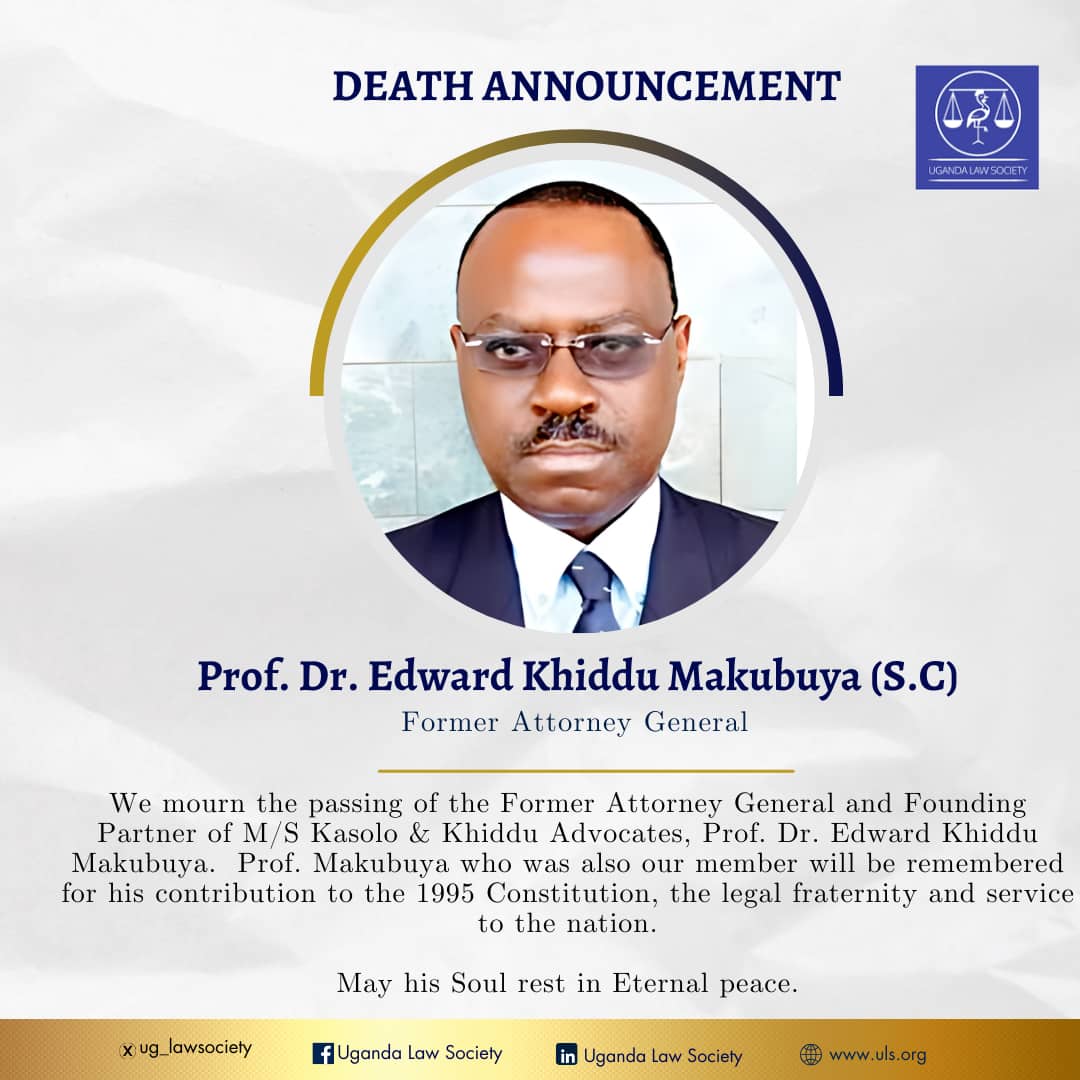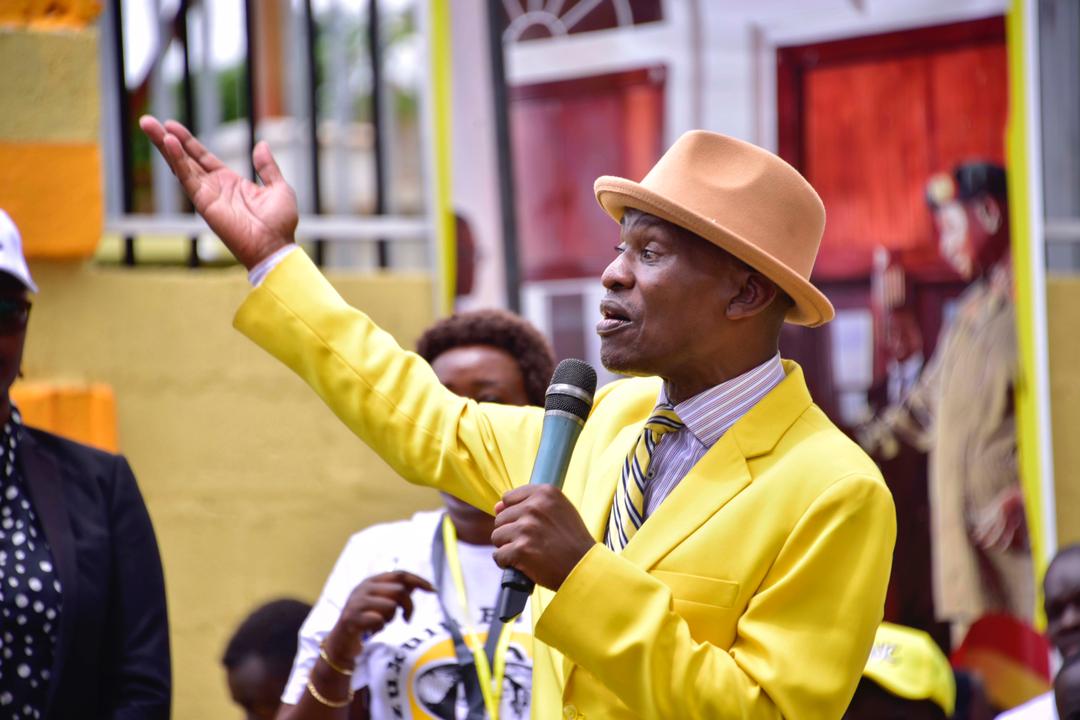
Edward Khiddu Makubuya, down-to-earth politician
https://observer.ug/index.php/news/headlines/82219-edward-khiddu-makubuya-down-to-earth-politician
Written by URN
Edward
Khiddu Makubuya, who lived a distinguished life as a law professor,
legal and human rights scholar, and Attorney General, passed away on
Monday aged 75.
Born and raised in Bulemezi, Makubuya's
illustrious career spanned various high-profile roles, including state
minister for Foreign Affairs, minister of Education, and state minister
for the Luwero Triangle.
Makubuya's academic achievements were
equally exceptional. He graduated with first-class honours in Law from
Makerere University in 1974, followed by a Master of Laws and a Doctor
of Juridical Science from Yale Law School in 1976 and 1979,
respectively. His dedication to the field of law was evident through his
leadership as editor-in-chief of the Uganda Law Society Review and as
head of the Department of Law and Jurisprudence at Makerere University.
In 1995, he was appointed director of
the Uganda Human Rights and Peace Center, further solidifying his
commitment to human rights and legal education. Despite his academic and
professional accomplishments, Makubuya was known for his humility and
sharp sense of humour.
This was
particularly evident in his parliamentary appearances, where his wit
often shone through, especially during his tenure as minister of
Education and later as minister of Justice and Attorney General.
Makubuya was also a devout Christian, often drawing on his faith in his
public speeches. During a censure motion against him as minister of
General Duties, Makubuya quoted Chapter 3 of Ecclesiastes as he
gracefully accepted his fate and departure from the cabinet.

“There is nobody who was born knowing
how to be a minister of government,” said Makubuya as MPs pushing for
his censure listened attentively.
"For everything, there is a season and a
time for every activity under heaven, a time to be born, and a time to
die...A time to become minister, and a time to cease to be minister"
Makubuya proclaimed his exit from the cabinet. “Madam speaker Hon
members thank you for listening to me."
Makubuya's career, however, was not
without controversy. In 2010, he authorized a payout of Shs 169 billion
to businessman Hassan Basajjabalaba and another Shs 14.9 billion to
retired Col John Mugyenyi as compensation for lost market tenders. This
decision ultimately led to his resignation on February 16, 2012.
Colleagues
and contemporaries remember Makubuya as a down-to-earth politician who
lived a simple life despite his prominence. Former Prime Minister Dr
Ruhakana Rugunda described Makubuya as a "fine legal brain" who made
significant contributions to Uganda as an academic, politician, and
student leader.
As minister of Education and later
minister of Justice and Attorney General, Makubuya would walk without
security from his office at Embassy House and Rajar Chambers to
parliament despite the risks it posed. This down-to-earth approach would
land him in trouble in January 2003 when suspected car thieves
kidnapped Makubuya and his wife and held them hostage for hours.
Fortunately, they were not harmed. His official car was later recovered
in Kenya.
Makubuya's rise to prominence began in
1986 when President Museveni established a commission of inquiry into
human rights violations between 1962 and 1986. Makubuya served as the
top legal mind on this commission, contributing to a comprehensive
4,000-page report documenting atrocities, including those committed
during Idi Amin's regime.
His work on
this commission and the subsequent 1995 Odoki Constitutional Commission
marked significant contributions to Uganda's transitional justice and
social reconstruction.
At the time of his death, Makubuya was
among the 14 members who had been nominated in 2021 for yet another
Constitutional Review Commission that was to be chaired by Prof Fredrick
Ssempebwa.
One of Makubuya's most controversial
decisions came in 2005 when, as minister of Justice and Constitutional
Affairs, he advised the cabinet to remove provisions allowing
individuals to run as independents in elections. He believed that this
would strengthen the multiparty system and promote party discipline,
though the proposal faced significant opposition.
In 2006, Makubuya again courted
controversy by advising Uganda's Electoral Commission that opposition
leader Kizza Besigye should be barred from the ballot due to treason and
rape charges against him drawing widespread criticism.
Edward Khiddu Makubuya will be
remembered as a key figure in Uganda's legal and political history,
whose contributions to the country's development were profound and
far-reaching.


